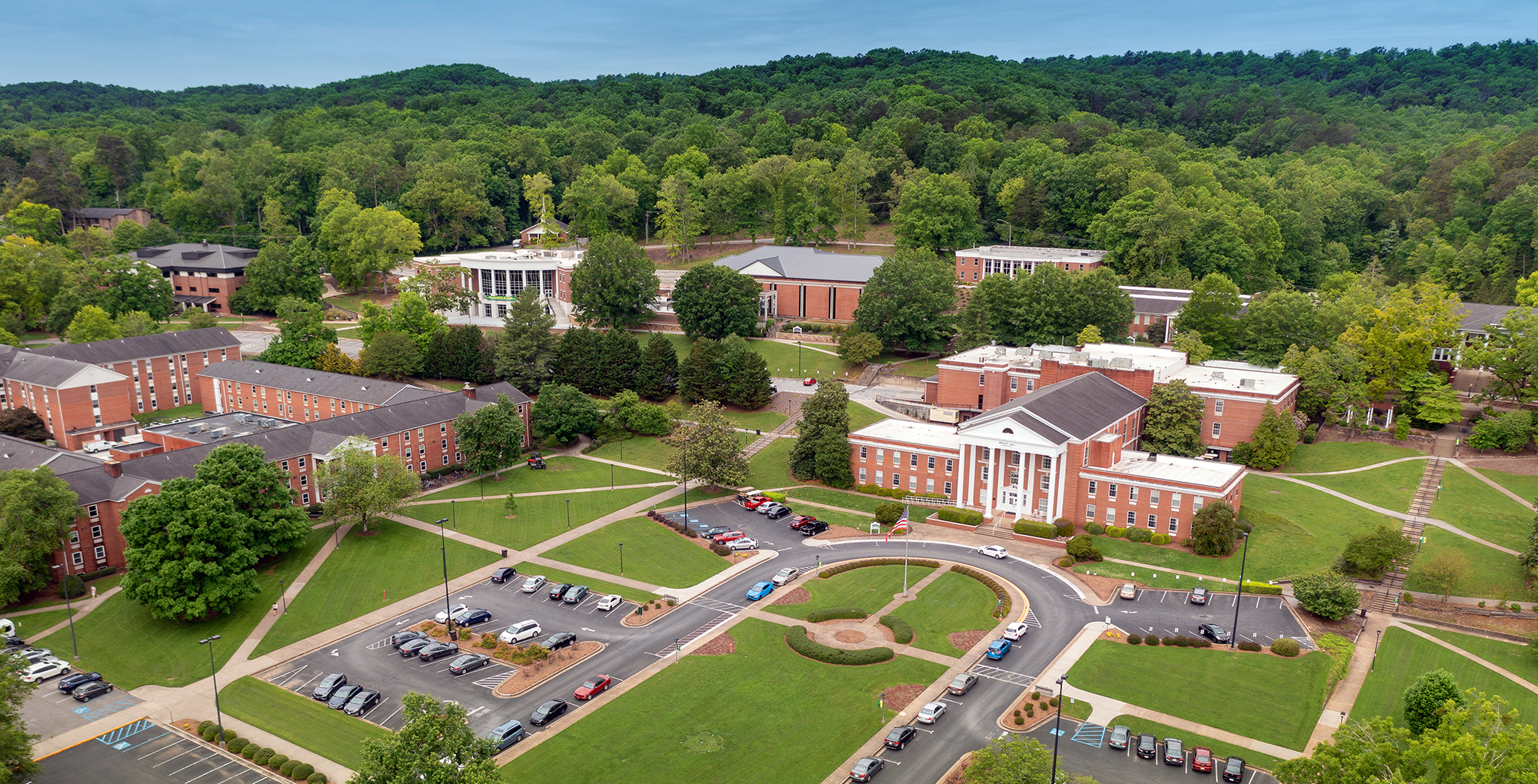
Quicknotes | august 2023
Oral History Project Update
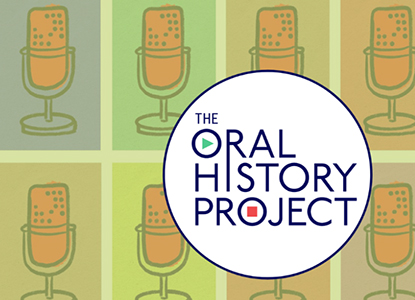
You may remember the article about collecting alumni stories in the last issue of QuickNotes; we have begun the process and alumni have already shared more than 700 stories!
If you received a postcard or email regarding updating your information and telling your stories, that is legitimate. It’s a communication from Publishing Concepts, Inc., a company that we have partnered with for this project. They specialize in gathering stories at a scale that we could not do on our own. We hope you will be able to take the time to call in and share your story, and we appreciate the many alumni who have already done so!
Visit the FAQ page to learn more about the project.
-Staff Report
Southern’s Culinary Medicine Labs

The School of Nursing and the School of Health and Kinesiology have partnered at Southern to teach students in the nurse practitioner program how to help patients cure their chronic diseases, not just treat them with medications.
Thanks to a grant from The Ardmore Institute of Health, Southern is one of the first nursing programs to include a Culinary Medicine Lab in its advanced practice provider curriculum as an opportunity for nurses to add practical skills and experience to their conceptual knowledge of lifestyle as a medicine (see video summary).
“Most chronic diseases right now, like cancer, obesity, diabetes, cardiovascular diseases are directly tied to nutrition,” says nursing professor Lily Tryon, DNP, ’82 and’14. “[But] traditionally nutrition has taken a very small role in medical education, and even advanced practice provider education.”
A stigma around healthy food being bland or complicated prevents many people from taking it seriously as a treatment for disease. Chef Bonny Musgrave, Vegetarian Culinary Arts Director, has a passion for changing that perspective. “They can’t talk about how good it is and be excited about it if they haven’t done it themselves and been excited themselves. So it’s just really important to bring them into the kitchen and show them how good it can be and show them how easy it is to cook healthfully.”
“I really believe that the emphasis in this class on plant-based or plant-forward diets and health promotion and disease management and reversal is really going to help me help the clients and help meet their needs for making the very necessary changes,” says nursing graduate student, Delores Rugless, ’81.
While this class is currently an elective for the nurse practitioner program, the School of Nursing has plans to integrate it into the core curriculum. In the meantime, those students who choose to take it are eager to apply their newfound nutritional knowledge and hands-on experience with food as a tool for healing into their own lives and into their continuum of patient care.
-Staff Report
From Dream to Dream Career
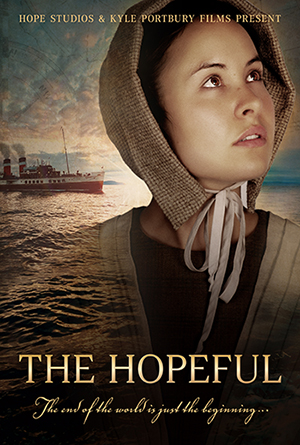
Kevin Christenson, ’16, always knew he wanted to do something creative; he just never imagined he’d be able to build a career around his dream. So when he came to Southern, he studied international business and Spanish, and signed up for Destiny Drama Company on the side. His plan was to work in business to support himself and enjoy film as a hobby.
The idea of being able to succeed in a creative business first sparked when Doug Frood, then associate VP for budgeting and financial analysis at Southern, and the drama company director recommended starting a dinner theater, which turned into a comedy show, and then became Studio 4109.
“That was where I got my crash course in producing. I wasn’t just an actor, I was learning to write, run a writers’ room, deal with budget, deadlines, etc.,” says Christenson. “It was a great experience for business to essentially run a small company through Southern, and it became large enough that it was actually a line item on Southern’s budget before it was adopted into the Student Association.”
“That was one of my best experiences at Southern, and I don’t think I could have had that experience at any other university,” he adds. “There was a combination of enough support for that kind of creativity, plus enough financial support to have a program like that and a large enough student body to pull that level of talent from. It helped give me the experience of how the creativity and business could come together. And I had really great mentors there that showed me it didn’t have to be a secular hobby, but I could use it for God and for mission.”
Still, Christenson wasn’t sure what it could look like in the real world. He had been interning at Kettering Health every summer during college, but when he graduated, he decided this was his best opportunity to take the risk and explore opportunities in the film space. A professor at Southern helped him get connected, and he started out playing extras on movies and shows in Atlanta. After getting some speaking parts, he had the opportunity to work as an executive producer’s assistant where he learned about really big budget shows.
Then experience as a supervisor and manager gave him further insight into the business management side of the film industry, and that gave him the opportunity to step into an executive producer role at Hope Studios, one of two new subsidiaries of Hope Channel International, which were developed to enhance outreach to younger demographics.
His experience with Netflix and other studios gave Christenson the knowledge to guide the new organization’s business model to allow them to do things Adventist media hasn’t traditionally done, such as maximizing tax incentives.
“There’s a quote from Christ’s Object Lessons that basically says religion and business are not two separate things; they are one,” says Christenson. “One thing I appreciated about Dr. Oberholster at Southern is that he taught us that you don’t have to compartmentalize mission and business. It’s really something that’s interwoven together. I’m excited about how we’re taking a business approach to what we’re doing with our missional media. That’s what allowing us to be able to reach these new heights and reach new people and reach them where they’re at.”
That’s what Christenson and the Hope Studios team is aiming to do with their newest production, The Hopeful. It originated out of Australia, where the conference wanted to tell the story of our Adventist pioneers. They hired Kyle Portbury, who worked for the media center there, and it became the biggest film production the Adventist church has ever done. But with more money came more voices, and the run-time ended up being around three hours long—too long for cinemas to take. So they used the footage to create a mini-series and never executed the theatrical option of their contract.
Christenson and Portbury met when Christenson was staying with friends in Texas. Portbury was teaching at Southwestern Adventist University, at the time (when Ken Shaw, ’80, also was president), and on a recommendation from his friends, Christenson walked into Portbury’s office and introduced himself. Portbury shared his vision, and while Christenson wasn’t in a position to do anything about it, the idea stuck with him.
A few years later, when Christenson started at Hope Studios, he knew exactly what he wanted to take on as their first big project: a 90-minute feature film of the church’s origin story. He reached out to Portbury, now an Emmy Award-winning director.
“When we started, we didn’t anticipate it being as high-quality as it’s become, but it was kind of a lesson in ‘o ye of little faith,’” says Christenson. “Kyle would call me and say guess who we got as our colorist—the guy who did The King with Timothee Chalamet. For our score, we got a guy whose been doing the music for the Star Wars properties, and he’s an Adventist. The biggest surprise was when he told me that Grammy-award winner Jonas Myrin, who wrote the songs Cornerstone and 10,000 Reasons, would write two original songs for The Hopeful.”
Having Myrin on board brought Capitol Christian Music Group to the table, and multiple company executives sat for a private screening of the film. The next day, one of Capitol's presidents shared with Portbury that he dove deeper into “that Ellen character” to learn more.
“You’re telling me that one of the most powerful people in the music industry took his free time to do research on the Adventist church,” Christenson says. “That’s amazing. That’s the purpose of this film: to inspire curiosity.”
In producing the film, they listened to the opinions of non-Adventists, and edited until everything made sense to them. They worked with them to ensure that no element felt “too preachy.”
“We worked until we had several non-Adventists saying ‘this is a compelling story, I want to learn more,’” says Christenson. “We want Adventists to be proud of this film; it’s our story. We want them to engage with it and share it, but to understand it’s not made for them. It’s a tool for them to use to share our message around the world.”
The Hopeful is scheduled to come out in cinemas in 2024. To learn more about Hope Studios and the work Christenson and the team are doing there, visit hopestudios.org.
-Staff Report
Music Brings Healing and Harmony
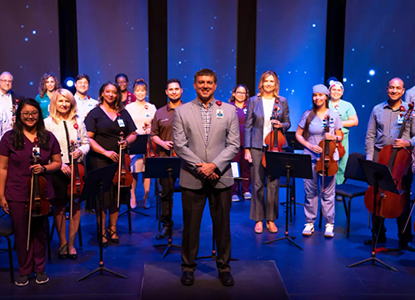
It was a dark time for healthcare workers, when Richard Hickam, ’00, director of music and the arts for AdventHealth, thought of a way to let in a little light.
The pandemic was in full force. Every day more people were dying from COVID-19. And healthcare workers were worn out. What if, Hickam thought, music can help? After all, music and the arts and the love, faith, connectedness and healing that comes with them are intrinsic to AdventHealth.
So with support from leadership, he decided to form an orchestra, the first all-employee orchestra in the organization’s nationwide healthcare system.
“Humankind was as isolated as it’s ever been, and I realized the tremendous need for connection. In my mind, an orchestra was the perfect way to bring us back together,” Hickam said. “For years I’ve been wrangling musicians who work at the hospital to play for company events, so I knew we had the talent.”
It started with strings — violin, viola, cello and bass — cobbled together from clinicians and office workers who auditioned, and eventually expanded to brass, wind and percussion instruments – clarinet, flute, oboe, bassoon, trumpet, trombone, French horn, tuba and timpani. Today, there are almost 60 members, including at least 17 Southern alumni!
Mostly strangers until now, the rag-tag group of musicians includes physicians, nurses, music and respiratory therapists, pharmacists and lab techs intermingled with team members from finance, HR, IT and even a CEO from AdventHealth’s Tampa market. It feels like a high school band room, albeit with more attentive students.
At rehearsals, which are held once a month, everyone swaps memories of their old music teachers, marching for halftime shows in college, playing hymns at church, and knowing that through kids, careers, marriages and moves, their passion for music remained.
But life gets busy and time to practice and play gets more and more scarce. Hickam said that’s been one of the most rewarding things about starting the orchestra — seeing members dust off their old instruments and fall back in love with a forgotten hobby.
"I had really stopped practicing for the most part,” said Ndala Booker, ’91, a health and biomedical assistant professor at AdventHealth University who started violin lessons at 7 years old. “Being in an orchestra again brings me back to the person I was before all of the other facets of life happened.”
The group’s first performance was recorded at the Dr. Phillips Center for the Performing Arts in the summer of 2021. It was a requiem — Samuel Barber's Adagio for Strings — for the patients, team members and people across the world who perished during the pandemic. At the end, the group stood to bow, wearing the white coats and scrubs they wear every day to work.
The orchestra played its first public performances this past December, Christmas concerts at Disney Springs and the Orlando Union Rescue Mission.
Speaking with WMFE’s Nicole Darden Creston for 90.7’s arts, culture and entertainment show Spotlight, Hickam thought back to those first rehearsals.
“It’s a bunch of strangers in the room. And then, all of a sudden, in this medium through the gift of music, we’ve become something new. Something creative. Something that I hope energizes the community and can bring wholeness to those who we perform for. And for ourselves.”
-by Caroline Glenn, Senior Communications Specialist, AdventHealth (adapted); photo credit: Matt Rainey, AdventHealth
School of Business Launches "MarketPlace"
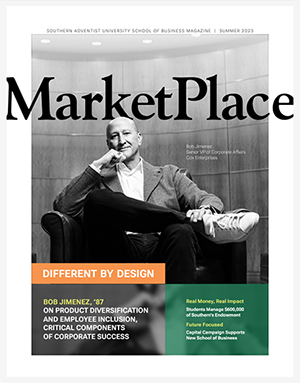
-by Stephanie Sheehan, PhD, Dean
In 2005, I was finishing my eighth year of a career at SunTrust, now Truist, as a regional vice president of marketing. It was a high time in the industry. The company was preparing to report nearly two billion in net income, a 26% increase over the prior year.
It felt good to be part of that success, but I was searching for more. Yet God instructed me to stay—as a corporate missionary.
Maslow would have suggested that I was aspiring for level five in his hierarchy of needs, where I could achieve my full potential. However, more simply, and richly, put: God was furthering my calling, and just as He called me to stay at SunTrust, He later called me to the mission field at Southern Adventist University for a project manager position in the School of Religion. An important component, essential to my core, had been missing. I needed to find it.
I transitioned from the downtown corporate rush hour to worship hour in Hackman Hall on Southern’s campus. Six years later, God called me to a faculty position in the School of Business, where He blended my passion for mission with my business acumen and experience. It was an honor to join a team of professors who had hands-on business experience and a collective yearning to be about their Father’s business.
Now, as dean since 2018, I have had the opportunity and privilege to watch our students and alumni find their callings and make enormous contributions in their earthly communities while winning eternal victories for the Kingdom of Heaven.
As I look at our approximately 450 business students and meet with students from other majors who are taking business classes, I’m inspired that they are going to find exactly what they are looking for: excellence in business education with an emphasis on His desire for us to view the marketplace with a missional mindset.
That’s what this new School of Business magazine, MarketPlace, aims to highlight. Visit our website to read the magazine online.
Upcoming Events
Mental Health Week Convocation: “Shadows Define the Light” by Me Ra Koh – August 31
Service Expo – September 7
Blue Zones: Unlocking the Secrets of Longevity – September 21
Homecoming Weekend – October 26-29
Reconnect with friends and former classmates at this year’s Homecoming Weekend on Southern’s campus! Featuring Dwight Nelson, ’73, as our guest speaker, along with many traditional and all-new events, the celebration promises to be a fun and meaningful time of fellowship, food, and fond memories. See what’s new this year, and sign up to attend at southern.edu/homecoming.